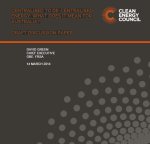A draft discussion paper from Australia’s Clean Energy Council looks at the benefits of a shift to a more decentralised energy generation model.
The electricity system is already transitioning towards a model where large numbers of smaller generators provide the bulk of Australia’s electricity. More than two million Australians are taking control of their energy costs and driving a more competitive, productive, and open energy market says the CEC.
The paper looks at three main areas of benefit from decentralised energy generation.
More competition
With the proliferation of decentralised energy generators, such as small scale solar power systems, this creates a supply and demand imbalance that puts downward pressure on wholesale electricity prices.
Lower cost infrastructure
Up-front costs have dropped dramatically for wind and solar PV; both large and small. Decentralised projects can be delivered through different ownership models as they are an inherently lower-cost form of infrastructure.
More efficient use of resources
A decentralised model of generation offers opportunities to reduce loss factors in the transmission of electricity; which can account for up to 10% of electricity generated via traditional means. An increase in households and businesses supplying their own power also means less pressure on the distribution grid.
The CEC sees the role of grid-supplied power potentially being inverted, switching from being the primary source of electricity to a safety net supplier of last resort.
“As with all disruptive technologies, a more distributed form of generation creates winners and losers, and many of those who have benefited from the traditional system will have an obvious tendency to resist change and the ability to protest loudly,” says Clean Energy Council Chief Executive David Green.
“Others will embrace change. It is an exciting and dynamic time for the energy sector to drive innovation and reach for the future.”
Produced for last week’s Australian Davos Connection Forum on National Infrastructure; “Centralised To De-centralised Energy: What Does It Mean For Australia” can be viewed here (PDF).












































